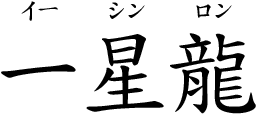| |
The so-called "Evil Dragons"
(Jaaku Ryû) in DBGT have quite different names than you may be used
to. Traditionally among fans and on the internet, these Dragons were given names that correspond to the approximate Japanese
pronunciation of the Chinese characters their names are written with (got all that?! ^^;;). The problem with this stems from the
fact that the Dragons are named after the Dragon Balls, themselves, which are also named/spelled with Chinese characters that have
approximate pronunciations (as per the furigana written above the Chinese characters). Not only are the Dragons
named for the Dragon Balls, but also for each number of the Balls, as well. Confused yet? Well, not to worry; we'll start
from the beginning, and lay it out step by step!
One of the biggest fan misconceptions about the names of these
Dragons (which has unfortunately been aided and abetted by FUNimation's English dub), is that they are
all named as "—Shenlong" or "—Shenron." As a matter of fact... they aren't. Whereas
"Shen Long" (given the Japanese approximation of "Shenron") is Chinese for "Dragon
God" or "Divine Dragon," the Evil Dragons are named after the Dragon Balls, and thus do not follow quite
the same pattern. While they keep the "Long" ("Dragon") part of the name, they are actually
named according to the number of stars in the Dragon Balls they sprang from. Remember, the Dragon Balls are named after the
number of stars in each one, so that "Yi Xing Qiu" is (literally) the One-Star Ball. Thus, these Dragons
are named in the pattern of "— Xing Long,"
or "— Star Dragon."
That only addresses part of the issue, though. Many fans
also feel that the only correct way to write these names is with the Japanese pronunciation, rather than using the Chinese spellings
as we just have. But this argument doesn't hold any water if you examine the names more closely. Here's an example, using the
One-Star Dragon's name as it is written out:

As you can see, the name is written in Chinese characters
with Japanese above the characters; this is furigana, and serves as a helper in pronouncing the word. This is usually
included for children on more difficult or obscure kanji they may not have learned yet, but it is also handy when the
kanji is shorthand for something longer, an aural pun, or a word from Chinese or Korean. While Chinese characters generally have
the same or similar meanings in Japanese, they tend to have vastly different pronunciations, and thus a pronunciation guide is
necessary for these Chinese words.
So, what's correct? Technically, the names are spoken aloud
in the series using the Japanese pronunciations above the Chinese characters. At the same time, they were only pronounced that
way because the Voice Actors themselves were unfamiliar with Chinese and may not have been able to produce the right
sounds to pronounce the names correctly. So, since the names are written with Chinese characters to begin with, and are intended to
be pronounced as though they are Chinese, they should probably be romanized as Chinese, rather than Japanese (which
would be something like a secondhand translation). Here's a chart showing the different names and pronunciations:
Stars |
Chinese Name |
Japanese Approximation |
FUNimation Name |
One |
Yi Xing Long |
Iishinron |
Syn / Omega Shenron |
Two |
Liang Xing Long* |
Ryanshinron |
Haze Shenron |
Three |
San Xing Long |
Sanshinron |
Eis Shenron |
Four |
Si Xing Long |
Suushinron |
Nuova Shenron |
Five |
Wu Xing Long |
Uushinron |
Rage Shenron |
Six |
Liu Xing Long |
Ryuushinron |
Oceanus Shenron |
Seven |
Qi Xing Long |
Chiishinron |
Naturon Shenron |
*The Chinese word for "two" is actually
"Er," which is carried through to the name of the Two-Star Ball, "Er Xing Qiu"
(written in Japanese as "Arushinchuu"). "Liang" is closer in meaning to "pair" than
"two," so the reason for this change remains a mystery.
[ return to Tidbits main ] |
|